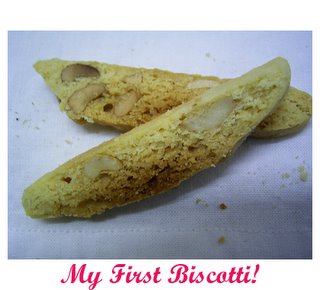As I just wish try for the first time, I reduced all ingredients into half & less sugar and become:
* 1/4 butter
* 50g brown sugar
* 1 egg
* 1 cup flour
* some nuts
* without vanilla, baking powder, salt
1. Butter + Sugar & mix; then Egg & mix; then Flour & mix
2. Recipe stated the dough is sticky, mine is VERY sticky, can't even hold in hand :p
3. Add the nuts and dry apricots.
4. Make it into two doughs.
5. Preheat microwave @ 180 C (my microwave don't have 190 C :p)
6. Set 15 min baking time
7. After 9 min, nice cookie smell ;) After 10 min, over bake smell! Opps! :(
8. It's all because of the apricot!! :( Dig out all the apricots..
9. Since the dough is a bit harder compare to the dough, although it's not hard enough yet, but don't care :p I just cut it into thin pieces, put in the tray on their sides.
10. Continue baking for 4 min; turn to the other side, another 4 min.
And..... it become like this >>>>

Hahaha.... So happy, 60% look and taste like the biscotti in the cafe, which come with the cappuccino!!
I think the other 40% is because of the nuts are too little and less variety, the biscotti is not thin and hard enough, and a little bit too sweet :p
* * * * * * * * * * * * * * * * * * * * * * * * * * * * * * * * * * * * * * * * * * * * * * *
The Italians use the term biscotti to refer to any type of cookie. In North America, biscotti is used to describe a long, dry, hard twice-baked cookie with a curved top and flat bottom designed for dunking into wine or coffee. The name biscotti is derived from 'bis' meaning twice in Italian and 'cotto' meaning baked or cooked.
Biscotti is said to have originated during Columbus's time and credited to an Italian baker who originally served them with Tuscan wines. They became so popular that every province developed their own flavored version. Because of their long storage ability they were an ideal food for sailors, soldiers, and fisherman. Most European countries have adopted their own version of biscotti: English - rusks, French - biscotte and croquets de carcassonne, Germans - zwieback, Greeks - biskota and paxemadia, Jewish - mandelbrot, and Russians - sukhariki.
* * * * * * * * * * * * * * * * * * * * * * * * * * * * * * * * * * * * * * * * * * * * * * *
No comments:
Post a Comment